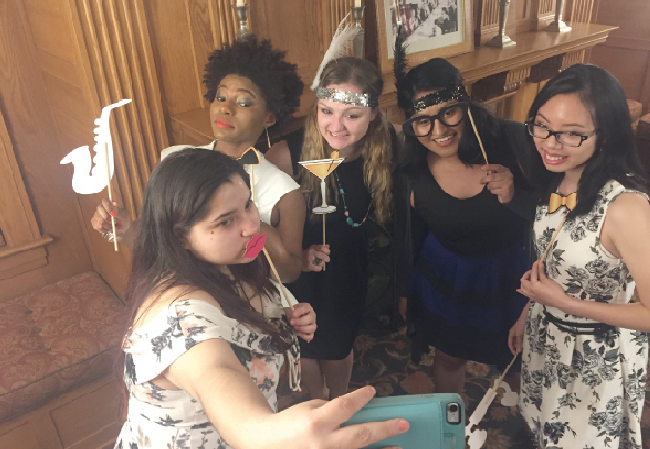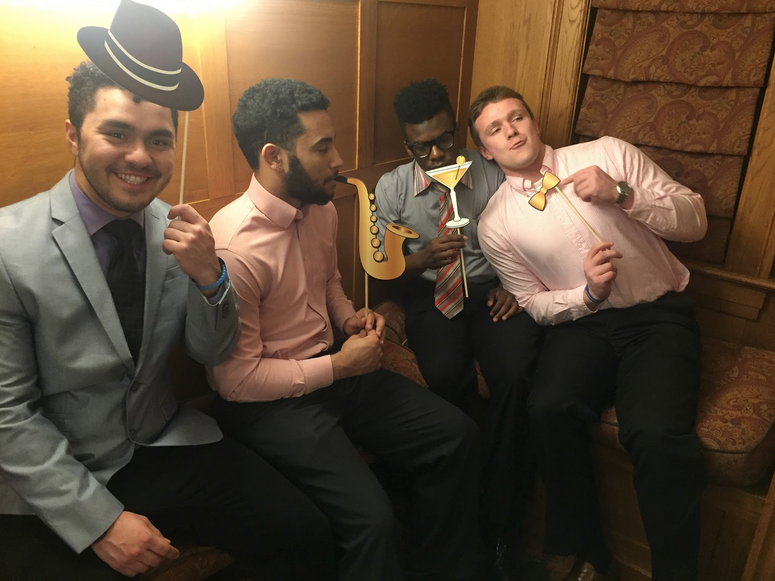Ebony Ball celebrates beauty
Students pose for a selfie with photo booth props at the Association for the Advancement of Black Culture’s annual Ebony Ball on Friday, Feb. 24, 2017, in the Tillotson Room in the Patricia Bush Tippie Alumni Center.
The Association for the Advancement of Black Culture hosted the annual Ebony Ball on Friday, Feb. 24 in the Tippie Alumni Center as part of Black History Month.
“It’s a tradition we do every year. It’s always on the map,” said Black History Month Chair Cristin Archer, ’19.
The Ebony Ball has been hosted by ABC since the early years of the club’s foundations in the 1980s according to Archer.
“Ebony Ball is about this idea of celebrating beauty,” Archer said. “So there’s this idea of issues of black males going after white women, and issues of black females being seen as less attractive, so it just goes to this idea of celebrating black excellence and black unity, black beauty.”
The Tillotson Room of the Tippie Alumni Center was adorned with black and gold balloons and streamers and featured a polaroid photo booth with paper cutout props. The ball was catered by Grace Asian Restaurant
The 2017 theme for the Ebony Ball was the Harlem Renaissance, which worked alongside the 2017 theme for ABC’s Black History Month, “Don’t Call it a Comeback.”
ABC President Yemi Olaiya, ’17, said rediscovering black identity and black history in recent years has become a trend.
“But we [ABC] think that black identity has always been around. It’s not something that’s new, it’s not a trend, it’s not going away,” Olaiya said. “So we were thinking of celebrating it in a way where it’s always been and thinking of what that means to us, both as a club and a community.”
Archer highlighted the significance of that endurance of black identity with respect to the Harlem Renaissance — the 1920s’ and 1930s’ social and cultural movement of black achievement and recognition.
“We’re kind of going back to a time when music, jazz music, was more associated with black people, and all these things were associated with black people before white people took them over. So it’s that idea and the idea of ‘Don’t Call it a Comeback,’” Archer said. “It’s not like we’re reclaiming these things. These things were always associated with us — we started them.”
The Harlem Renaissance theme was selected as a reflection of historical as well as current events, according to Olaiya.
“Everyone can throw out ideas, and it’s pretty much what we all just pick up on. That was the one that I threw out and we kind of just ran with it. It was more so because of what’s going on currently in our community and the country in general, so it was just the vibe we were going with,” Olaiya said.
The Ebony Ball fell at the end of Black History Month, honoring ABC’s other February events in celebratory fashion.
“It’s [Black History Month] going out with a bang, and Ebony Ball is just a great way to come together and enjoy each other’s company,” Andre Bryan, ’18, said.
Students celebrated black beauty by taking photos with friends and waiting in anticipation for their polaroids to develop.
“We’re celebrating who we are. We’re accepting who we are,” Archer said.
The evening also provided a greater sense of community for students of color, particularly black students, according to Archer.
“I’m excited in the way that everytime I go to an event like this, it brings me closer to people. I meet more black people. So it strengthens the community, and it strengthens my support that I have on campus and their support that they have on campus,” Archer said.
As senior members of ABC graduate, Olaiya said that the sense of community and the more than 30-year tradition of the Ebony Ball will continue as underclassmen cycle up into leadership positions.
“Allegheny is small. I think it’s important that we teach each other as much as we can since nobody is here forever,” Olaiya said. “Things obviously don’t have to be done the same way … because you can celebrate Black History Month and black excellence no matter where you are.”








